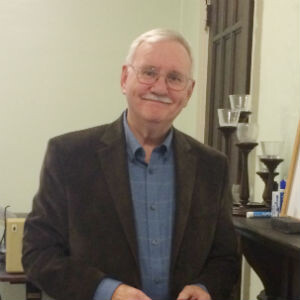Penn Resource Offers Insight Into American Language, Slang and Culture
When Shiho Nagai began attending the informal, not-for-credit slanguage sessions at the University of Pennsylvania’s Christian Association, she had in mind improving her English skills. But she quickly found that another benefit of the class was getting a taste of life and culture in the United States.
In a class discussion of presidential politics, for example, Nagai, a native of Tokyo, learned that, when someone in the U.S. talks about how a political candidate “slams an opponent,” it means that he or she is bringing up unflattering information or saying something negative about them.
Instructor Bill Kelly started the slanguage class nearly 18 years ago to help international students and visitors learn to understand American English. He was inspired by his extensive travels to Belarus, China, Cuba, Malawi and South Korea.
“I know the challenges of trying to cross the language and cultural barrier, and I am sympathetic,” says Kelly.
He uses material from news articles and popular songs, and students bring questions to the class about words and phrases they don’t understand.
In another discussion, Kelly tackled the presidential election process.
“The students have a hard time with the Electoral College,” he says. “They wonder, ‘How did you Americans come up with such a bizarre way of electing a president?’”
Kelly, a retired economics professor who taught at the University of Georgia, University of Colorado in Colorado Springs and University of California, Los Angeles, as well as Belarus State University, offers the two-and-a-half hour class every Tuesday afternoon at the Christian Association at 37th and Sansom streets.
He became associated with Penn as a volunteer at the CA in 1997. In early 1998, he and the Rev. Beverly Dale, executive director of the Association at the time, launched the class. Since then about 600 people have taken it, with students coming from more than two dozen countries.
Nagai, a computer programmer for Penn’s Perelman School of Medicine, began attending the class shortly after she and her husband moved to Philadelphia in September 2013.
Like Nagai, many of the students are in Philadelphia because their spouses are working or attending graduate school at Penn. Nagai’s husband is a cancer researcher.
Through a class excursion this fall, Nagai had the opportunity to experience her first activist event, an anti-gun violence rally on campus, at which speakers remembered loved ones who had been killed with guns.
Kelly says he got the idea for the excursion since some of the students are from countries where public demonstrations are discouraged by government or law enforcement officials.
The experience was eye-opening for Nagai who said it is uncommon in Japan that you hear about someone being killed by a gun, so she doesn’t fully comprehend gun violence or murder.
Public demonstrations are also rare in Japan, and Nagai says she was nervous and uncomfortable as she walked along with the chanting crowd on Locust Walk.
“Japanese people are introverts and don’t speak their minds in public places,” says Nagai. “I thought maybe I should not be here.”
Over the years, the class has evolved into a kind of cultural resource. Kelly starts each session with a question-and-answer period that often centers on ordinary life and contemporary events. Issues range from how to handle problems with a landlord to going to the doctor to American wedding customs.
One day, Hui Liu, of Dalian, China, a visiting scholar in radiology at the Perelman School of Medicine, came to the class very concerned after being bitten by a tick.
“I was very nervous,” says Liu, who was afraid that she could become infected with Lyme disease. “I told Bill about it, and he told me that it’s not a deer tick and not to be nervous.”
The class provides an opportunity for students to meet and socialize with people across campus, and participants have become a tight-knit multi-cultural community. This fall, Kelly and a group of slanguage students attended a Penn Symphony Orchestra concert to support Nagai who plays the viola in the group.
This winter, Nagai will be returning to Tokyo. She says in two years she has attended more than 90 slanguage classes, and she will cherish the many experiences from the U.S.








